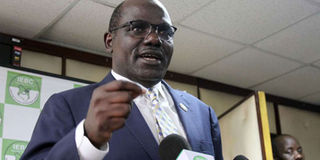IEBC committed irregularities, illegalities in presidential poll

IEBC chairman Wafula Chebukati addressing journalists at Anniversary Towers, Nairobi, on September 1, 2017. PHOTO | EVANS HABIL | NATION MEDIA GROUP
What you need to know:
As to whether there were irregularities and illegalities committed in the conduct of the 2017 Presidential Election, the court was satisfied that the 1st Respondent committed irregularities and illegalities inter alia, in the transmission of results, particulars and the substance of which will be given in the detailed and reasoned Judgment of the court.
Regarding costs, each party shall bear its own costs.
Pursuant to Rule 23(1) of the Supreme Court (Presidential Election Rules) 2017
[1] The hearing of this Petition was concluded on Tuesday, 29th August 2017 well after 9.00 p.m.
The Judges thereafter retreated to deliberate on the following issues for determination as crafted by the court:
(i) Whether the 2017 Presidential Election was conducted in accordance with the principles laid down in the Constitution and the law relating to elections.
(ii) Whether there were irregularities and illegalities committed in the conduct of the 2017 Presidential Election.
(iii) If there were irregularities and illegalities, what was their impact, if any, on the integrity of the election?
(iv) What consequential orders, declarations and reliefs should this court grant, if any?
MAJORITY DECISION
[2] Having carefully considered the above issues, the following is the majority decision of the court with two Judges (J.B Ojwang and N. S. Ndung’u SCJJ) dissenting):
(i) As to whether the 2017 Presidential Election was conducted in accordance with the principles laid down in the Constitution and the law relating to elections, upon considering inter alia Articles 10, 38, 81 and 86 of the Constitution as well as, Sections 39(1C), 44, 44A and 83 of the Elections Act, the decision of the court is that the 1st Respondent failed, neglected or refused to conduct the Presidential Election in a manner consistent with the dictates of the Constitution and inter alia the Elections Act, Chapter 7 of the Laws of Kenya.
(ii) As to whether there were irregularities and illegalities committed in the conduct of the 2017 Presidential Election, the court was satisfied that the 1st Respondent committed irregularities and illegalities inter alia, in the transmission of results, particulars and the substance of which will be given in the detailed and reasoned Judgment of the court. The court however found no evidence of misconduct on the part of the 3rd Respondent.
ILLEGALITIES
(iii) As to whether the irregularities and illegalities affected the integrity of the election, the court was satisfied that they did and thereby impugning the integrity of the entire Presidential Election.
[3] Consequent upon the above findings, and as to what orders, declarations and reliefs this court should grant, the following are the orders of the court pursuant to Article 140(2) and (3) of the Constitution and Rule 22 of the Supreme Court (Presidential Election) Rules:
(i) A declaration is hereby issued that the Presidential Election held on 8th August 2017 was not conducted in accordance with the Constitution and the applicable law rendering the declared result invalid, null and void;
(ii) A declaration is hereby issued that the 3rd Respondent was not validly declared as the President elect and that the declaration is invalid, null and void;
BEAR OWN COSTS
(iii) An order is hereby issued directing the 1st Respondent to organize and conduct a fresh Presidential Election in strict conformity with the Constitution and the applicable election laws within 60 days of this determination under Article 140(3) of the Constitution.
(iv) Regarding costs, each party shall bear its own costs.
[4] A detailed Judgment containing the reasons for this decision and the dissents will be issued within 21 days of this determination in conformity with Rule 23(1) of the Supreme Court (Presidential Elections) Rules, 2017 as it is otherwise impossible with the limited time the court has, to do so.
[5] It is so ordered.
The ruling was signed by Mr Justice David Maraga, Justice Philomena Mwilu, Justice Smokin Wanjala and Justice Isaac Lenaola





